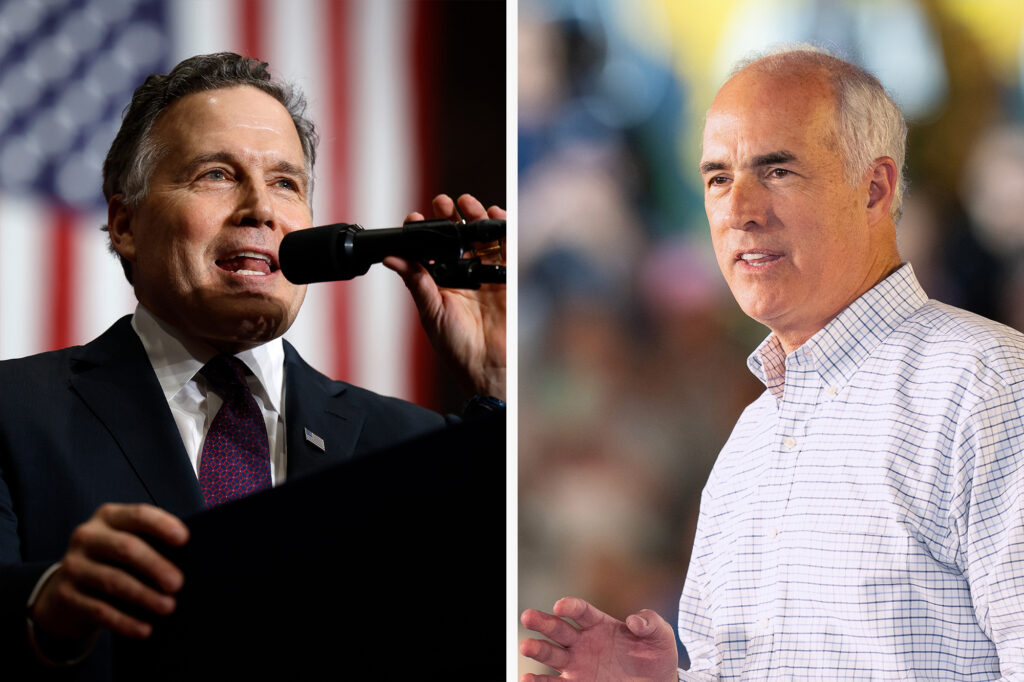Pennsylvania’s U.S. Senate candidates, Democrat incumbent Bob Casey and Republican challenger Dave McCormick, have clashed over energy policy since the campaign began. McCormick’s ads portray Casey as anti-fossil fuel, linking him to Vice President Kamala Harris’ past anti-fracking comments. Casey defends his support for fracking and an “all of the above” energy strategy that includes fossil fuels and clean energy investments, as backed by the Biden administration’s Inflation Reduction Act.
On Oct. 3, the candidates will debate in Harrisburg. Here are seven climate and energy questions the moderators should ask.
For Sen. Bob Casey
- Do you believe fracking in Pennsylvania is currently being adequately regulated and monitored? If not, what should the government be doing differently to protect Pennsylvanians’ health and the environment?
Casey supports “responsible fracking” that is “regulated and closely monitored to protect our communities.” Environmentalists and public health experts argue that fracking isn’t regulated enough to prevent water contamination, air pollution, and health issues. Recent studies support this view.
- How would you address the concerns of climate activists and residents of environmental justice areas in Pennsylvania whose communities may become the future sites of two Department of Energy-funded hydrogen hubs? What should count as “clean” hydrogen and what should not?
Casey backed two hydrogen hub proposals, MACH2 and ARCH2, calling hydrogen a “potent energy source.” Local activists criticize these projects for potential environmental impacts.
Environmentalists are particularly concerned about the ARCH2 proposal, which would use fracked gas to make hydrogen and is supported by CNX Resources.

- Like Gov. Josh Shapiro, you’ve embraced an “all of the above” energy policy platform that encourages investment in renewable energy but doesn’t offer plans to decrease fossil fuel extraction in Pennsylvania. But you’ve also spoken about the “devastating impacts” of the climate crisis and said we need to “invest in meaningful climate action now.” Given the direct impact that fossil fuel extraction has on greenhouse gas emissions, how do you reconcile these positions? How have you supported “meaningful climate action” in your three terms as senator?
Casey voted against a fracking ban in 2021 and criticized President Joe Biden for pausing new liquified natural gas exports, citing concerns for Pennsylvania’s natural gas industry. Federal figures show Pennsylvania’s natural gas production has increased 43 times since Casey was first elected.
For Dave McCormick
- Is there any threshold of global warming at which you would change your mind about the need to increase fossil fuel extraction?
McCormick acknowledges climate change is human-caused but advocates for increasing U.S. oil and gas production. Scientists warn that without reducing fossil fuels, the world could surpass the 1.5 degrees Celsius warming limit set in the Paris Accords, leading to catastrophic consequences.

- What is your plan to help Pennsylvania adapt to a changing and increasingly damaging climate, and who will pay for it?
McCormick has discussed the need to “manage” climate change through adaptation. Extreme weather events are already affecting Pennsylvanians, costing local governments money. Estimates suggest climate adaptation could cost Pennsylvania up to $15 billion by 2040.
- Your wife, Dina Powell McCormick, sits on the board of the fossil fuel company ExxonMobil. How does her role affect your decisions and perspective on energy policy in the United States and abroad?
For Both
- How will you position Pennsylvania to become competitive in the clean energy economy of the future?
Pennsylvania lags behind other states in the clean energy economy, ranking 45th out of 50 for electricity generation from renewable energy and last in renewable energy growth over the past decade, according to PennEnvironment. Pennsylvania only ranks in the top 10 for one metric: electric vehicle sales.
Original Story at insideclimatenews.org

